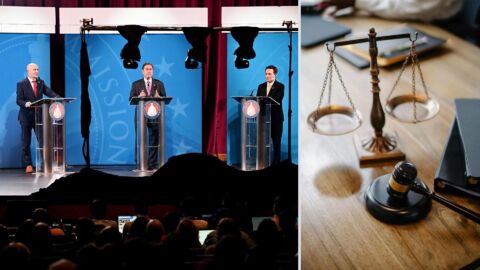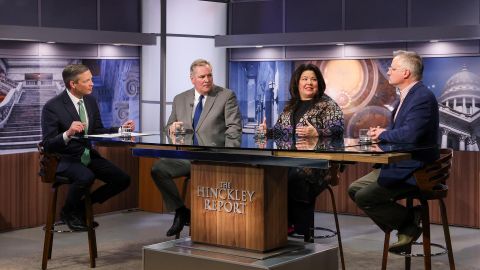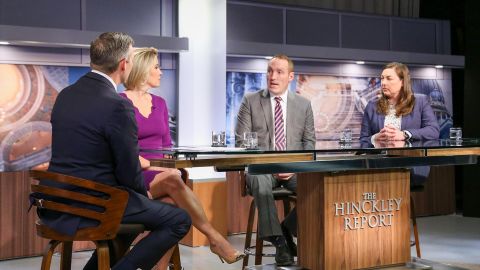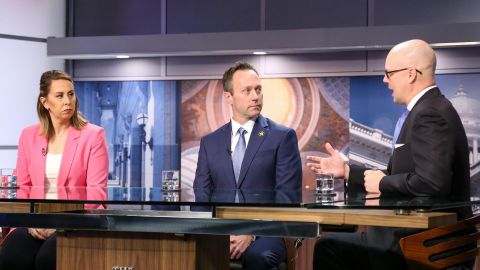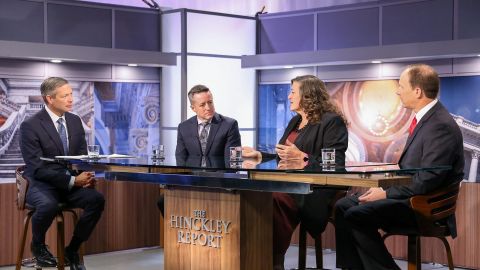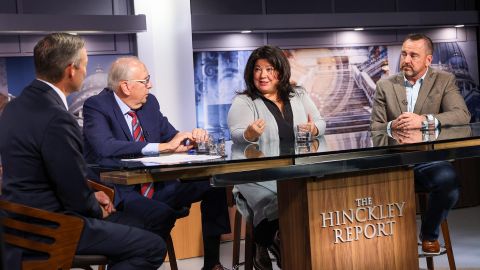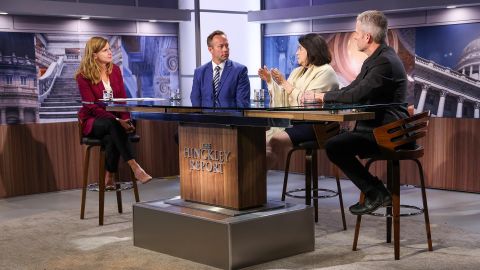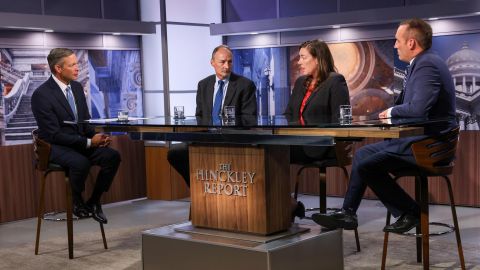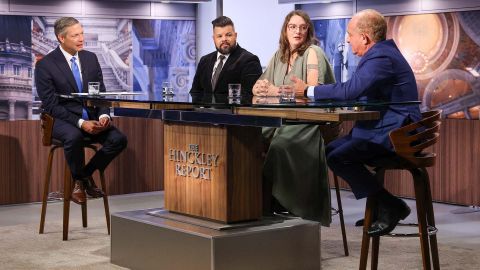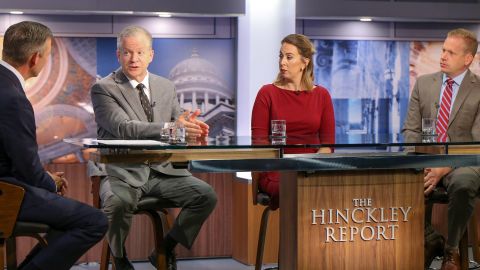announcer: Funding for "The Hinckley Report" is provided in part by the Cleone Peterson Eccles Foundation Fund, Merit Medical, and by contributions to PBS Utah from viewers like you.
Thank you.
Jason Perry: Tonight on "The Hinckley Report."
Utah's legislature wraps up the 2024 session after passing a historic number of bills.
Our panel examines which issues took center stage and which didn't make the cut.
And as the results of Super Tuesday are tallied, what takeaways emerged ahead of the race for president?
♪♪♪ ♪♪♪ Jason Perry: Good evening, and welcome to "The Hinckley Report."
I'm Jason Perry, director of the Hinckley Institute of Politics.
Covering the week we have Leah Murray, director of the Walker Institute of Politics and Public Service at Weber State University; Greg Skordas, legal analyst and co-host of "KSL at Night"; and Max Roth, anchor with Fox 13 News.
So glad to have you all here.
What a big week in politics, our legislative session ended, and we jumped right into the national scene in terms of candidates and Super Tuesday.
This is a big night.
I want to first start with the legislative session though, if we can.
Five hundred and ninety-one bills passed.
That's kind of a lot, it's a record, in fact.
Last year was the record, 575.
This year, 591.
I think it's important for us to maybe talk about what some of the big themes were this session and maybe some of the big bills.
Leah, what do you think?
Give us a theme.
Leah Murray: Yeah, so I would say, being from Weber State University, the thing I'm always tracking is how the legislature feels about higher education, right, Jason?
So, like, the answer is there were a number of bills about diversity, equity, and inclusion, about whether our syllabi need to be publicly available, about what bathrooms look like on a campus, right?
And when you're thinking about a university, that affects changing rooms, right?
So, it's not just a bathroom bill, it becomes how do you implement where students, you know, can get changed for the gym when they go to work out.
And so, a lot of the conversations on the Hill affected higher ed kind of specifically, but also generally.
And so, I was tracking that a lot.
Jason Perry: It seemed a lot of those higher ed bills, you know, had started in one place, there was a lot of discussion, a lot of dialogue, until we got what we did.
And many legislators involved in this, but they clearly interested in higher ed.
Leah Murray: Yeah, exactly, and I thought one of the most interesting bills that failed was the one that had Senator John Johnson placing a Gen Ed College at the University of Utah, right?
And so, the answer is clearly they are interested in what we are teaching, right?
And so, we need to be thoughtful about--you know, and people are not super trustful right now of higher ed.
Does that make sense?
So, I think they are reflecting what is a national mood about what's happening, yeah.
Max Roth: Leah, I'm wondering if you could clarify.
I don't know if our viewers know, but Gen Ed College is not something that all of us know as a term.
Leah Murray: Yeah, sure, so when you go to college, I mean, it might have felt like as a student, you know, like a Chinese smorgasbord menu, right?
So, like, the university says to you, you need to take how many credits from life sciences, how many credits from social sciences, how many credits in math, how many credits in language, and that's what we call a general education.
So, all across the country, the United States has this thought about what it means to be an educated person, and the state of Utah has its version of that.
Does that make sense?
And it doesn't look totally out of line with what other states have or other, you know, campuses have.
And so, I think Senator Johnson had a feeling about what that general education should look like, and so he ran a bill that failed to build the curriculum, if that makes sense, right?
So, he was basically going to say to the U, this is what it should be, and this is what we're gonna do.
Jason Perry: Greg, what's interesting about this too is that Utah is not the only state that has been looking at these programs, the diversity, equity, inclusion programs and the courses across the country.
Are we part of a national trend here in what we saw this session?
Greg Skordas: Certainly, a national trend as it relates to right leaning states.
I mean, that whole DEI idea came out of the chute really quickly with the legislature.
I mean, it was something they wanted to address right at the beginning.
There were a couple of bills that not just with respect to DEI, but with the trans community, there were some bills relating to public records, GRAMA, that type of thing.
I thought the legislature--and DEI, I don't know that we really defined it very well, and I don't know that the public really understands it very well, but the legislature certainly put the kibosh to that, and I don't know how educators are going to deal with it in the future.
I'm sure that's going to be very, very difficult, but it was something that I didn't expect to be such a hot topic with the legislature.
And they came right out of the chute with that.
Max Roth: Right out of the chute with that, absolutely, and as you mentioned, Leah, with the bathroom bill, transgender students using the bathroom of their birth certificate rather than how they identify, and then the other, the third bill, the first three bills to pass other than some real basic technical stuff they have to pass were those two, and the sovereignty bill saying that the state could--can essentially overrule a federal law or federal agencies would have to get permission, essentially flipping that federal-state supremacy in a way.
Well, I'm interested in that, that response as a legal person.
Greg Skordas: Yeah, I mean, you have to wonder where we're going, but it sort of, I think, stems from where we were with-- when Roe v. Wade got flipped over a year or two ago.
And that--and a lot of states are now going into saying, "Well, maybe it's our decision how to do that."
And I think that that whole sovereignty notion is let's get away from federal regulation, let's get away from federal rules, let's get away from the feds telling us what to do, and let's put more of it on the state.
That flies in the face of the Constitution of the United States, which defines what the states can do and what the feds can do.
Well, I'll be interested to see how far the legislature wants to push that.
My sense is in the next year or two, they're going to see how far they can push that envelope.
Jason Perry: Max, how about you?
A theme of the session?
Max Roth: Well, it's always interesting.
I'm, you know, the--I'm influenced by what we've been saying here, that we get these bills that we describe as controversial, and in a sense they really are.
There's a whole lot of interest, and yet we have such a super majority legislature that there's not real controversy within the body itself.
These things pass very easily.
The other big thing that they have to do by the end of the session is pass a budget, a $29 billion budget.
A lot of that is from the federal government, but within that budget, you know, the governor expressed some priorities at the beginning of the legislative session that really did not play out.
He wanted a lot more money for homeless services than he got.
And so, so that's an interesting thing.
The other thing that came up that I think a lot of people were curious about is how we perceive athletic teams in the state.
And then what role the government has in funding those teams and how taxpayers should play a part in that if they should.
Greg Skordas: Yeah, and the name, image, and likeness of our athletes as well.
And whether or not we're going to fall in line with a lot of other states with respect to our athletes who are receiving benefits and how much of that can be disclosed to the public.
I mean, I think that's something that a lot of us, especially in the media, think is important, but maybe as it relates to having our athletes sort of on the table when other states are not making that information available puts them at a disadvantage.
Jason Perry: We probably should explain that just a little bit too, and, Max, maybe through the lens of someone that's just in the media.
This name, image, likeness, of course, the University of Utah is connected to this issue.
But one of those provisions that was in that bill was that the contracts between players and their sponsors are not public records.
Those are private records.
Do that, and put in that also in the broader context of several GRAMA, government record access management, bills that came out this session.
Max Roth: Yeah, these are real concerns, and this is as somebody who's in the media.
You know, I--the objective hat maybe doesn't stay on quite as well, because we have a natural inclination to want things to be open.
I, in my job, constantly am looking at government databases to see how much money is being spent, how much money is being paid, and so there's that bill, name and image and likeness, but also in regard to the calendars and records of public officials and keeping those private is a real concern.
And then with the water commission and keeping the proceedings of a committee that's dealing with an issue that's crucial to so many of us for the air we breathe and the-- this beautiful state where we live, not being able to know all that's happening with that.
Leah Murray: Right, and I would just push back a little bit.
Oh my goodness, how do I say this?
When we talk about name, image, and likeness, those are student athletes, right?
So, to a certain extent, I'm not sure what the public needs to know or whether they should know everything about a student on a campus.
Like, I think FERPA, which is our privacy rights around education, might come into play as well too.
And then I'm just gonna push back a little bit, Max, on the water.
I think the reason why you--GRAMA exempt that commission is so that people can walk in and say things that if Max Roth is paying attention, they're gonna pay for in their next election cycle, right?
And so, I thought the idea was, you know, maybe transparency when we're trying to have hard conversations about really important, critical issues is not always to the good.
Greg Skordas: Do you push back on the notion of releasing public officials calendars?
Leah Murray: Yeah, I guess I'm not sure about that one either, right?
I want to be clear, I know.
I feel badly sitting next to Max, and, like, the side-eye that I am getting from him.
Right, you know, but I just kind of question sometimes, I think the media feel like they have the right to know, and I have read the First Amendment, so I understand the role and importance that the media play in a republic like we have.
But then in some cases, I think, I don't think they need to know what Dylan Jones maybe is having in his conversations about his contracts, right, at Weber State University.
And I'm also not sure that if the media knows everything, there's good governance all the time.
Max Roth: Yeah, you know, it's-- I wonder, I do want to push back, because I do think that, you know, sunlight is the best disinfectant, and I think that if you make that just kind of a halfway approach and you start deciding, well, yeah, we're gonna have this public committee, but they don't have to tell us what they're doing, and they--and we don't get to see what they're doing.
you know, that's--I--what you're saying, I think, is similar to kind of in terms of name, image, and likeness reminds me of the court system where maybe a younger person, a juvenile court, is not public.
But again, even the student athletes, they're adults.
I mean, we know what tennis players make when they compete in a tournament, tennis players who are much younger than some of the university athletes.
I don't know how it hurts them and how it hurts us to not know what's happening in our universities.
Jason Perry: We're gonna be watching this one closely, because I think we're not done with this conversation.
Clearly, a couple sides to this one.
Greg, can we talk about potential vetoes for a moment?
Greg Skordas: Did the Democrats pass any legislation?
Jason Perry: They did indeed.
Greg Skordas: Well, then maybe there is something to talk about.
But really, I think the governor's made clear, and I-- sorry I cut you off, Jason--but that he's on board with most of what's going on.
We have a veto-proof legislature.
He seemed to be active in the legislature right at the outset, so I don't know that there's going to be a veto by the governor.
I mean, we had talked about a bill allowing teachers or providing guns for teachers, and that's had so much public outcry since it was passed that maybe the governor will change what has been perceived as his position on that.
But other than that, I don't know, Jason, that there will be any vetoes.
Jason Perry: Yeah, there was this one bill that you were representing, this is Representative Jimenez, the school employee firearms.
What it does is--firearms education for teachers, requires them to store their firearms in safes, but this is the one bill we're hearing about potentially.
But Leah, what's interesting is what the governor has said, to Greg's great point.
He said, "I probably don't have any bills to veto this time, because I engaged early," and with his concerns.
Leah Murray: Right, and do you think that's the right answer?
So, I mean, I think it is the right answer that if you do the work up front or ahead of the legislature or you are in a good relationship with the legislature, you might not have to veto that much.
But I also am aware, very cognizant of the fact that we're in an election year for him, and so then I wonder if the right answer is less I worked with them a lot, and a little more the answer is and I've got conventions to go through.
Does that make sense, Jason?
So I wonder how much of it is there's nothing to veto and how much of it is he is aware of the politics of the year.
Jason Perry: So, Greg, put this in context for us a little bit too.
Max mentioned this is a veto proof majority that the Republicans have with our legislature, but when you're going into an election year, some think, governor should keep a list of potential vetoes, not that he or she does that necessarily, but it's a matter of keeping the legislature in check.
Greg Skordas: Right, and I suppose that he did that preemptively, I think that he did that at the outset, and maybe the legislature knew bills that they didn't want to tackle because the governor had sort of showed his hand as the legislation was about--as the legislature was about to start.
So, I think they vetted all those out before the session started, and in that respect, I agree with Leah, it's an election year too.
He doesn't want to get sideways with his Republican constituents between now and November.
Maybe next year's session will see some vetoes.
Max Roth: I think some of what we saw from the governor too this year was him embracing his conservative politics.
I mean, he is a conservative, he's always been a conservative Republican, but he didn't let his his kind of kind--his better--what was it, disagree better?
He didn't let that filter him so much this time around.
You got the sense that he made a decision going into this legislative session that he was not going to be that guy as much in a political year.
And some of that when he talked about--when he was talking about trans kids and then describing the surgery specifically with the term genital mutilation.
Those kinds of things are things that I think surprised a whole lot of people who have grown accustomed to him being someone who avoids that kind of language, that kind of language that divides.
Jason Perry: Of course, as you all mentioned to these issues, they're thinking about the election for sure.
And we had a pretty big event.
Fifteen states, you know, and then we're here having Super Tuesday.
Leah, talk about that for just a moment, because the decision was made this year to do a presidential preference poll instead of presidential ballot where someone would actually mail in a ballot on this.
Talk about how this went, because we had some issues in the state.
Leah Murray: Yeah, I mean, I thought what was interesting, speaking with Republican friends and encouraging them to attend their caucuses, and one of my Republican friends said, "Why would I go?
It's just a preference, which means the delegate who gets chosen gets to do whatever they want at the next level, so why would I show up?"
And I think their turnout was 9% of their Republican members, and so I do wonder a little bit, Jason, the route they went, maybe they didn't message it well, right?
Maybe they didn't explain what they were doing well, but I feel like it caused pretty much die-hard Republicans maybe to not show up, and then the people who did come, we had these huge lines, right?
So, it just looks like a disaster.
Greg Skordas: You just kept hearing about the chaos of the caucuses, and the Republicans expressing so much frustration.
I don't know what it was all about, but probably to your point, too many people, too many lines, nobody can get a place at the table.
But I thought the caucuses by all accounts went pretty poorly.
Leah Murray: Right, and the thing is what I want to always say to people who have this nostalgia for, like, 1910, right?
Let's go back in time, but the answer basically is the reason we created technology was to make life a little bit easier and more efficient and a little bit I wonder if the Republican party trying to run things, you know what I mean, the way that we used to run things resulted in everyone understanding why we now have computers.
Max Roth: But technology kind of failed them in the sense that it's an older electorate that shows up to caucuses.
It's, yeah, it's gonna skew a little bit older, and people got to the caucuses.
I heard one man talking about being told he needed to register on his phone, and he said, you know, what--"Well, I have a flip phone in my car."
And so, it--that is, you know, that's a difficult thing to overcome if you're trying to do everything by smartphone.
Jason Perry: So, Max, to that point, for the people who showed up, so you had lower attendance, but the idea for Robert Axson, the Republican party chair, was that this would drive more people to it and maybe you'd have a broader base of participation, maybe even the national level taking a harder look at the state of Utah.
Did that happen?
And does it seem like the moderate section did attend the caucuses, or what has been traditionally the case?
Max Roth: You know, it's-- several years ago after Bob Bennett was kicked out of his office because he came in third at the state convention, Orrin Hatch got a whole bunch of people out two years later to get to the caucuses so it didn't happen to him.
We didn't--I don't--we didn't see that this year.
The Republican Party, there was a lot of advertising.
I saw little lawn signs all over the place saying, "Your Republican caucus is here."
I think they really tried to get people involved.
This is a year where there's not suspense.
Even going into Super Tuesday was pretty clear we are going to have a Trump-Biden election.
And so, what draws people to a caucus at that point?
Because--and the Utah Republican party has always been in favor of having some more barriers to entry.
They want people to be on the books, they want people to be signed up, and they want people to be involved if they're going to have a say, more so than the Democratic Party in Utah, where independents can vote without joining the party.
But it's interesting to see even then the outcome, I'm not sure what the motivation was, because Trump did not do as well in Utah as he did in other red states.
In fact, he did more poorly in Utah than any red state by far, getting 56% of the vote.
Jason Perry: Let's talk about that for moment, because that margin between Trump and Haley was much smaller than many thought in the state of Utah.
But it's still, she is dropping out of the race, sort of.
Suspending the campaign.
I wanna show a video, Leah, and you talk about what it means to suspend a campaign, because that's what Nikki Haley did.
Nikki Haley: I have always been a conservative Republican and always supported the Republican nominee, but on this question, as she did on so many others, Margaret Thatcher provided some good advice when she said, quote, "Never just follow the crowd.
Always make up your own mind."
It is now up to Donald Trump to earn the votes of those in our party and beyond it who did not support him, and I hope he does that.
Jason Perry: Talk about that for a minute.
I didn't see that she supported anyone, necessarily.
Leah Murray: Right, there was no endorsement there, right?
And I think I actually heard someone this week refer to Nikki Haley as a Reagan Republican, and my response to it was--and I guess that's an insult?
I'm surprised, like, so I had to really think about so what does it mean to be a Republican if being someone who reads like Reagan to you is someone who is problematic, right?
So, I think when she's saying there he has to earn, right, the votes of the Republicans who haven't really found him compelling thus far, I think a little bit she's talking about kind of an old school understanding of what Republican means.
Greg Skordas: And what does it mean to suspend a campaign rather than to say I'm out?
I mean, she suspends it, it's almost like she's still waiting in the wings.
There still may be--there still might be an opportunity for her to jump in.
It was interesting, that phraseology, suspending the campaign.
Sort of a time out rather than "I'm out, I'm done."
Max Roth: Well, once you're the last person in the race other than the guy who faces 90-some charges, indictments, then all of a sudden if you suspend your campaign, you still have one.
You're still holding on to your delegates until the convention, and so you get to that convention, if by some, you know, remote chance, Donald Trump is convicted, and, I mean, we have a Supreme Court decision that could come down that says that, you know, not that he's not eligible, but that he can be, that he doesn't have immunity, then who knows what could happen?
She might be the one on the white horse at that convention.
Jason Perry: There are certainly many people in Utah that were supporting her at the time, so we'll watch where those votes may potentially go.
I want to turn to the State of the Union for just a moment.
This is a big speech, maybe the biggest crowd President Biden will have from now until November.
Let's get some thoughts about this after we do a little recap and break down the pieces of this, including the Republican response.
Jenn Sullivan: President Joe Biden addressing the nation Thursday, his State of the Union address coming at a pivotal moment for his presidency, highlighting his accomplishments in laying out his plans for what he hopes to accomplish if elected for another four years.
Joe Biden: The State of our Union is strong and getting stronger.
Jenn Sullivan: Thursday's speech comes at a tumultuous time, both domestically and internationally.
Americans grappling with high inflation, issues surrounding women's health and the right to an abortion dividing many voters.
Joe Biden: If you, the American people, send me a Congress that supports the right to choose, I promise you, I'll restore Roe v. Wade as the law of the land again.
Jenn Sullivan: Biden also addressing the harsh criticism his administration has faced in regards to immigration.
Joe Biden: I will not demonize immigrants, saying they are poison in the blood of our country.
Jenn Sullivan: Following his address, Alabama Senator Katie Britt delivering the Republican response from her home, criticizing Biden and calling for change.
Katie Britt: Hard working families are struggling to make ends meet today, and with soaring mortgage rates and sky high childcare cost, they're also struggling to have a plan for tomorrow.
The American people are scraping by.
Jenn Sullivan: I'm Jenn Sullivan, reporting.
Jason Perry: Big speech, impact?
Thoughts about the speech, Leah.
Leah Murray: Well, I think he hit all the things he needs to talk about, right?
I think abortion so far in the last couple of years since Dobbs has been a winning issue for Democrats, so he mentions that.
I think he knows he's vulnerable on immigration, but where there's some strength in that is the fact that the former president, who is probably the person he's running against, says pretty awful things about immigrants and not all of America is on board with that kind of conversation, so he's able to swipe at Trump while also maybe demonstrating some strength in an area he's got issues with.
Greg Skordas: And I think that he did what he needed to do on immigration, which is to say we had bipartisan support for an agreement, we had the Senate on board.
It was these far right Republicans in the House that killed the deal, and they did that because they're catering to their eventual candidate and he said, "Don't pass this bill, because it'll look good for Biden, and it'll look bad for the Republicans."
So, I think Biden did a pretty good job on immigration of calling out the Republicans, almost by name, and saying we gave--we--you--we--you gave us this bill, you had bipartisan support, where is it?
Let's--and he even challenged 'em at the end and said let's pass this bill.
He's still pretending like it's on the table.
Max Roth: You know, and I think those things are critical and are more substantive than what may have been the most important thing he had to do last night in terms of his own political future.
I had breakfast with my parents this morning, because it's my mom's birthday.
So, we sat down and ate and talked, and my dad was mentioning as he was watching recaps of the State of the Union, then they'd go to a commercial break, and the commercials would be about Joe Biden tripping up the stairs and stammering and all these things suggesting that he's just too old for the job, he's--he doesn't have the mental acuity to do it.
He needed to counter that argument, and I think that they--I think he did pretty well with that last night.
He showed that he had energy, he stuck around for half an hour after the speech, talking to everybody, and the stumbles were very much just Biden-esque stumbles.
He does have a stammer, that's something he's had since childhood, but there wasn't anything where you thought, oh, he doesn't know what's happening.
Greg Skordas: And he was spontaneous.
I mean, he went off script a few times, especially when he was called out.
He had the wherewithal to jump into the fray a little bit when he was being mocked a little bit during the speech.
Jason Perry: In the last ten or fifteen seconds on that point, Greg, did he do what he needed to do for Democrats to come forward and say he's got four more years, he's the one they're all standing behind?
Greg Skordas: I think he gave Democrats some comfort that he's got the acuity and he's got the wherewithal and he's got the energy to run for office again.
Jason Perry: It's gonna have to be the last comment.
Thank you so much for your insights this evening, and thank you for watching "The Hinckley Report."
The show is also available as a podcast on PBSUtah.org/HinckleyReport, or wherever you get your podcasts.
Thank you for being with us.
We'll see you next week.
announcer: Funding for "The Hinckley Report" is provided in part by the Cleone Peterson Eccles Foundation Fund, Merit Medical, and by contributions to PBS Utah from viewers like you.
Thank you.
♪♪♪





